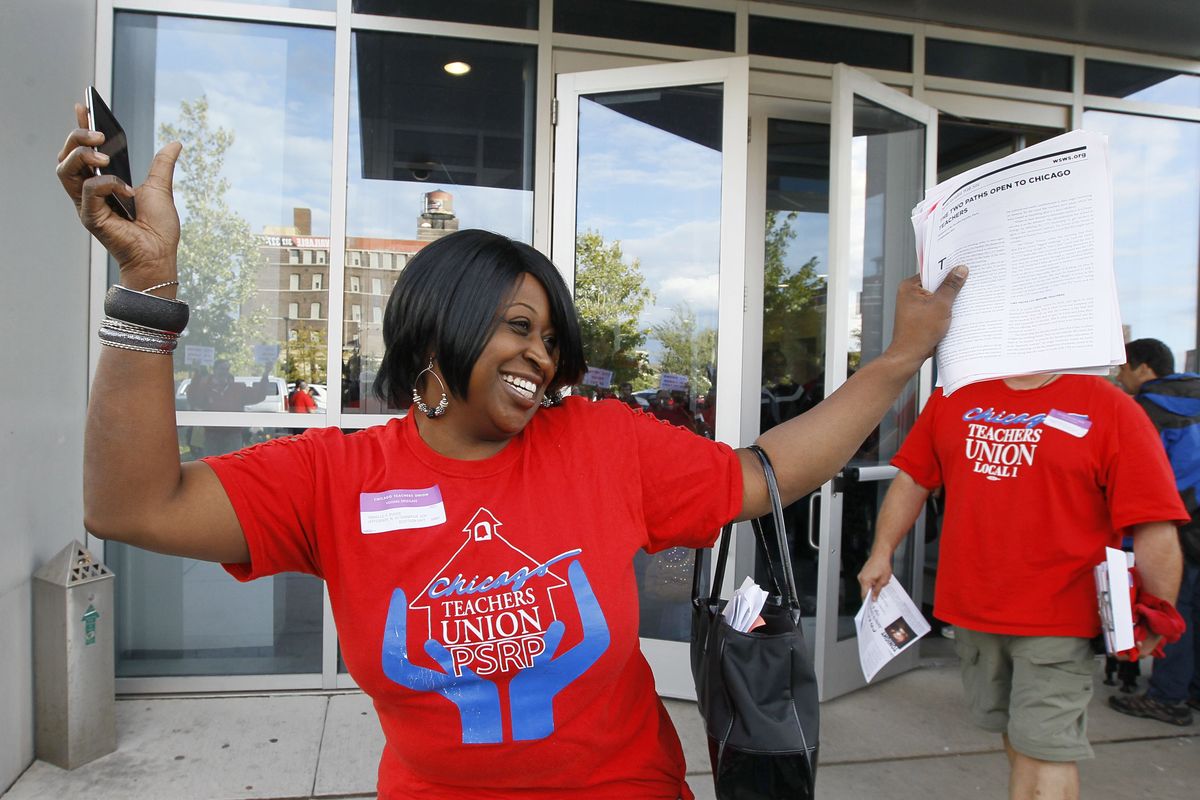School strike first of many challenges for Emanuel

CHICAGO (AP) — The grueling teachers strike is over. Now comes the hard part for Chicago Mayor Rahm Emanuel.
As he pushes ahead on his promise to reform the city’s underperforming classrooms, he faces several daunting tasks: slashing an estimated $1 billion budget deficit, confronting a woefully underfunded employee pension system and finding money for the pay raises that settled the first teacher walkout in a generation. He hasn’t ruled out school closings and tax increases, both of which would be hugely unpopular.
Waiting in the wings are other unions, including police and firefighters, whose labor contracts have expired and who no doubt took notes as the teachers stood up to the former White House chief of staff with the fearsome reputation.
The strike, which idled more than 350,000 children for more than a week, was the first time Emanuel was forced to make serious concessions since leaving Washington last year. But the challenges he faces aren’t unlike those confronting mayors in New York, Baltimore and elsewhere as they grapple with financial fallout from the Great Recession and urgent demands to improve public education.
“Union concessions won’t get him there,” said Ralph Martire, executive director of the Chicago-based Center for Tax and Budget Accountability. “And they can’t cut their way to a better education system.”
As he welcomed children back to school, Emanuel nodded at the difficulties ahead: “We have other tough things to do.”
The mayor said he’s made a good start by cutting $500 million from the district’s central office and crafting a three-year teacher contract that will cost $75 million a year compared with $130 million a year for the last contract. But he would not elaborate on reports that the city may be pressured to raise taxes on cigarettes and amusements, and close dozens of schools and move more rapidly toward cheaper charter schools.
The day after schools reopened, he appeared in a privately funded TV ad emphasizing the achievements in the deal with the union: a longer school day and year, the ability for principals to hire their own teachers and a new teacher-evaluation system based in part on student test scores.
But Martire said the financial troubles are more deeply rooted. Many were inherited from former Mayor Richard M. Daley, who avoided a strike in his more than two decades in office but at a price. When City Hall took control over Chicago’s schools in 1995, the pension system was almost fully funded.
“This is a crisis of their own doing,” Martire said.
In arguing for better job security provisions, Chicago Teachers Union President Karen Lewis warned that the city would close more than 100 of its 600 schools “as soon as the ink is dry” on the new contract. City Hall dismissed the number as a rumor, but acknowledged that closing schools will be under consideration.
Many districts around the country are feeling similarly squeezed because for years they avoided cutting per-pupil spending and ignored pension obligations, said Eric Hanushek, a senior fellow in education at the Hoover Institution of Stanford University.
“A number of states and localities are feeling under the gun. There are real pressures there, and I think it might continue for some time,” Hanushek said. “Pensions are certainly going to be the big problem. A large number of districts are trying to ignore them until they get so large, someone has to bail them out.”
Just last week in New York City, Mayor Michael Bloomberg asked the schools and all other agencies to cut their spending to deal with the city’s budget deficit after a plan to raise money by selling more taxi permits stalled.
Bloomberg, who gained control of the 1.1 million-student system a decade ago, is implementing a reform program that has closed more than 140 struggling schools and opened scores of new ones, including charter schools.
Meanwhile, districts also are struggling to implement the new teacher-evaluation system Chicago just adopted. Los Angeles schools are under a court order to come up with a plan after an education reform group sued. Baltimore’s system has spawned complaints that too many teachers ended up with unfavorable reviews, and test cheating scandals have erupted in some schools.
As he looks forward, Emanuel also faces questions about his aggressive style, which seemed to galvanize the teachers.
Early on in his term, he rescinded a 4 percent teacher raise and said students were getting “the shaft.” Then he tried to bypass the union to negotiate directly with individual schools over a longer day — an approach that may have ultimately fired up unions throughout the city.
“People have to come to the table and treat each other with respect,” said Chicago Alderman Bob Fioretti.
Fioretti suggested the teacher strike could portend problems with firefighters and police contract talks, though those unions cannot legally strike. Police and fire contracts expired in June, and union leaders have indicated they intend to keep the talks out of the public eye.
“I believe all negotiations should be done at the negotiation table,” said Thomas Ryan, president of Chicago Firefighters Union Local 2, who said issues include pay and response times. “We do not want to make this a public forum because I don’t think it helps either side.”
Don Rose, a veteran City Hall observer and political analyst, said Chicago mayors have a long tradition of “giving away the store to unions,” but Emanuel has to be careful not to try to demonize organized labor.
The mayor has to “cool the anti-union stance and make it financial, make it about taxpayers because police have a lot of support and firefighters have lot of support, even though they can’t strike.”
“Things like this are not forgotten,” Rose said. But Emanuel is “not a stupid man. He obviously will know how to recalibrate.”
___
Associated Press writers Hugh Dellios in Chicago and Karen Matthews in New York City contributed to this report.